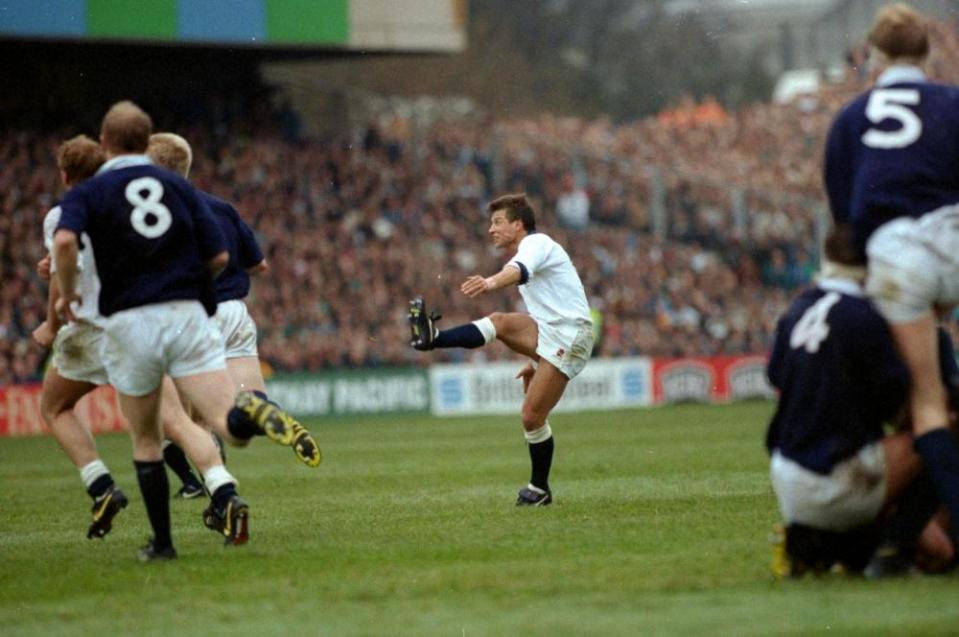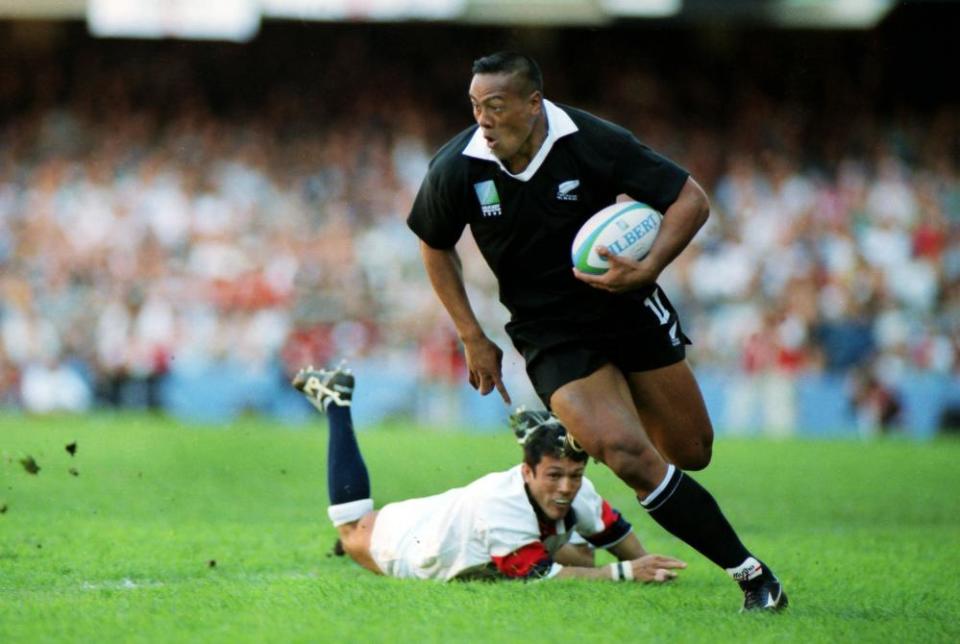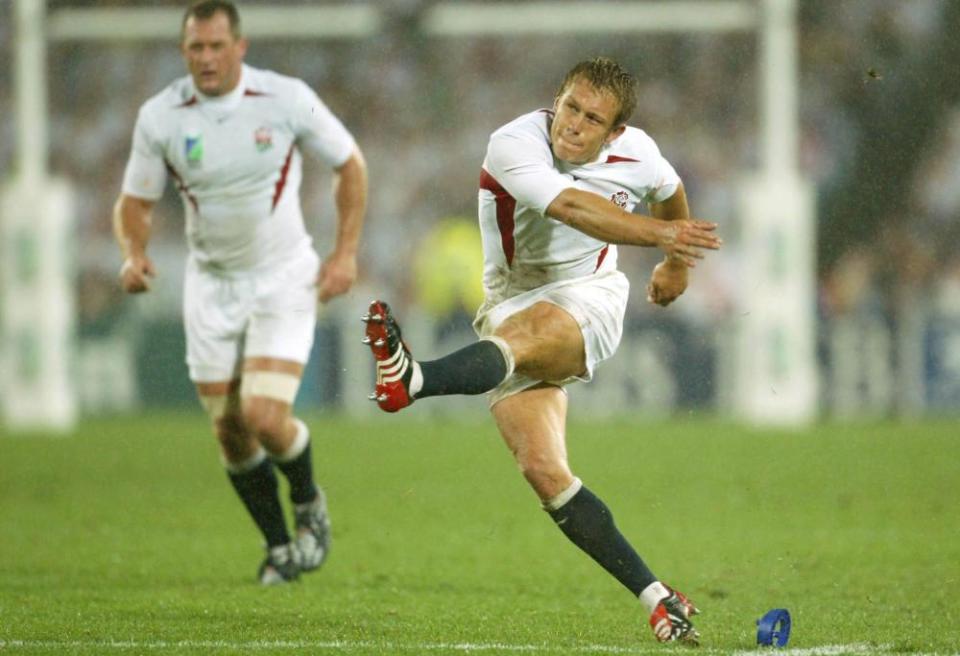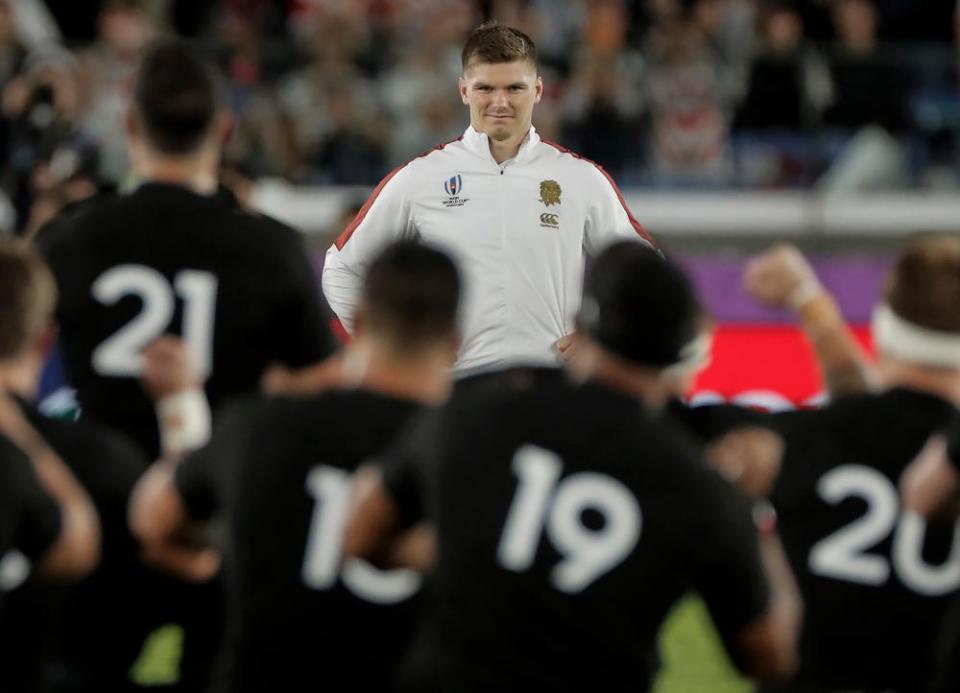Semi-skilled: England’s last-four World Cup record is cause for hope
1991 – England 9 Scotland 6
The 1991 Rugby World Cup was spread across five countries like some mad hatter’s picnic. Otley, Twickenham, Pontypridd, Dublin, Agen, Murrayfield … the only constants were England’s no-nonsense forward pack and David Campese in wind-up mode. Most remember the other semi-final, in which Campese’s brilliance shredded the All Blacks at the old Lansdowne Road, more than England’s last-four contest against Scotland in Edinburgh. With good reason: it was among the dourest knockout games in the tournament’s history. It was still 6-6 when Scotland were awarded a second-half penalty about 20 metres out just to the right of the posts. Gavin Hastings carefully settled the ball on a pile of sand – remember them? – and all of Scotland (and England) awaited the formality of three points. What we didn’t know was that Scotland’s captain had just been clattered by Mickey Skinner and was still slightly shaken. The kick missed to the right and a subsequent Rob Andrew drop goal sent England through, only for his side to lose the final against Australia in another low-scoring game. My own abiding memory of 1991? Nipping out to a Dublin pub for a quiet semi-final week pint of Guinness and bumping into the Wallaby front row, already in situ at the bar. Ah, ye olde amateur days.

1995 – England 29 New Zealand 45
What an unforgettable tournament. And, with respect to President Mandela, one man dominated all else. From our vantage point on the old press benches relatively close to the pitch at Newlands, there seemed nothing much on as the All Black scrum-half Graeme Bachop threw a long floated pass towards the left touchline. What followed was like something from a Godzilla movie. Jonah Lomu was still only 20 years old but the giant wing had the raw essentials – pace, power and agility – to make life all but impossible for isolated defenders. Tony Underwood and Will Carling were left sprawling before a half-stumbling Lomu rampaged straight over the top of the unfortunate Mike Catt. Barely five minutes later, a marauding Josh Kronfeld had scored a second and, with Zinzan Brooke popping over a 45-metre drop goal, England were flattened by half-time. It remains the most thrillingly destructive blast of rugby your correspondent has witnessed. Lomu ended up with four tries, also memorably grabbing Underwood by the collar in the second half and tossing him into touch as if he were putting out the rubbish. New Zealand, having led 35-3, did ease up to close the scoreboard gap slightly but you would have had long odds that night on England not losing another World Cup semi-final for (at least) another 28 years.

2003 – England 24 France 7
For much of the 2003 competition the sun shone and the French squad, staying out in Bondi, loved the Sydney beachfront vibe. Then, on the morning of the match, we all opened our bedroom curtains to find rain-spattered windows and weeping grey skies. Whether or not the weather spooked Les Bleus is academic now but England’s self-belief was unquestionably at an all-time high. They had headed down to Australia fully expecting to win and this was their time. Talk to the English forwards involved, even now, and this was the game in which they felt they really showed up. Riding shotgun was a 24-year-old Jonny Wilkinson, for whom the rugby pitch at weekends had become a sanctuary away from the anxiety and obsession that dominated his preparations. France scored an early try through Serge Betsen but England’s pack then grabbed the match by the scruff and never let go. Wilkinson, ignoring the conditions, contributed all his side’s points via three drop-goals (two off his right foot) and five penalties. “We knew it wasn’t going to be the most spectacular game of rugby but I think we did a fairly good job,” the ever-modest fly-half said later. The rest – the final against the Wallabies, Jonny dropping for World Cup glory – is now English rugby folklore.

2007 – England 14 France 9
The craziest World Cup of the lot from an English perspective. They had been thrashed 36-0 by South Africa in the pool stages and some players were packing their bags for home on the morning of the quarter-final against Australia. Suddenly here they were in Paris – as now – with a fighting chance of making the final. Off-field interest was beginning to spiral, with The Gambler by Kenny Rogers now the team’s unofficial anthem. “You’ve got to know when to hold ’em, know when to fold ’em …” And maybe France – could it be the same for the Springboks now? – were always going to struggle to hit the heights that undid New Zealand in a frantic quarter-final. England scored an opportunistic early try through Josh Lewsey but were still trailing 9-8 with six minutes remaining until some bloke called Wilkinson nailed a penalty and – there’s a theme here – a late drop goal. I remember writing a Guardian column with England’s Martin Corry (who can possibly forget his groundbreaking “Cozzacam” video diaries?) and asking what the game had felt like to play in. “Two fairly conservative sides playing with an increasingly greasy ball,” came the reply. “Then again the final scoreboard is the only entertainment you need if you’re playing in a World Cup semi-final.” Quite so.
2019 – England 19 New Zealand 7
After the typhoons, the earthquake tremors and Japan knocking out Ireland and Scotland, could there possibly be a more seismic shock? Eddie Jones, in a press conference at his team’s Disneyland hotel, did his best to spice up the pre-match formalities by alleging that persons unknown might have spied on England training and calling the New Zealand media “fans with keyboards”. In the event it was the All Blacks who played the cartoon fall guys as England – direct, physical and relentless – delivered one of the best performances in their history. Manu Tuilagi scored a second-minute try and George Ford, taking over the kicking duties from Owen Farrell, contributed four penalties. Afterwards, as Wonderwall and Hey Jude boomed around the stadium in Yokohama, it was tempting to imagine the Webb Ellis Cup might be coming home again. South Africa’s “Bomb Squad” soon put an abrupt stop to all that.


 Yahoo Sport
Yahoo Sport 





































